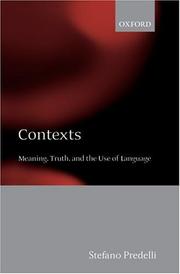| Listing 1 - 5 of 5 |
Sort by
|

ISBN: 9780199558117 9780199281732 0199281734 0199558117 0191603201 0199558116 9786612268236 0191535931 1282268236 1423769759 Year: 2005 Publisher: Oxford Clarendon
Abstract | Keywords | Export | Availability | Bookmark
 Loading...
Loading...Choose an application
- Reference Manager
- EndNote
- RefWorks (Direct export to RefWorks)
Context (Linguistics) --- Indexicals (Semantics) --- Semantics. --- Context (linguïstiek) --- Semantiek --- Taalfilosofie --- Context (Linguistics). --- Indexicals (Semantics). --- Context (linguïstiek). --- Semantiek. --- Taalfilosofie. --- Truth --- Meaning (Philosophy) --- Semantics (Philosophy) --- Contexte --- Indices (Sémantique) --- Vérité --- Signification (Philosophie) --- Sémantique (Philosophie) --- Indices (Sémantique) --- Vérité --- Sémantique (Philosophie) --- Lexicology. Semantics --- Philosophy of language --- Semantics --- Formal semantics --- Semasiology --- Semiology (Semantics) --- Comparative linguistics --- Information theory --- Language and languages --- Lexicology --- Meaning (Psychology) --- Indexicality (Semantics) --- Indices (Semantics) --- Grammar, Comparative and general --- Situation (Linguistics) --- Linguistics --- Deixis --- Context
Book
ISBN: 9780199695638 0199695636 0191760781 0191502162 9780191502163 9780191760785 Year: 2013 Publisher: Oxford Oxford University Press
Abstract | Keywords | Export | Availability | Bookmark
 Loading...
Loading...Choose an application
- Reference Manager
- EndNote
- RefWorks (Direct export to RefWorks)
Stefano Predelli explores the relationships between semantic notions of meaning and truth. He develops a 'Theory of Bias' in order to approach notorious semantic problems, offers a solution to Quine's 'Giorgione' puzzle and a new version of the demonstrative theory quotation, and defends a bare-boned approach to demonstratives and demonstrations.
Theory of knowledge --- Meaning (Philosophy) --- Truth --- Semantics (Philosophy) --- Signification (Philosophie) --- Vérité --- Sémantique (Philosophie) --- Philosophy. --- Philosophie --- Literature --- Literature and philosophy --- Philosophy and literature --- Intension (Philosophy) --- Logical semantics --- Semantics (Logic) --- Semeiotics --- Significs --- Syntactics --- Unified science --- Language and languages --- Logic, Symbolic and mathematical --- Logical positivism --- Meaning (Psychology) --- Philosophy, Modern --- Semiotics --- Signs and symbols --- Symbolism --- Analysis (Philosophy) --- Definition (Philosophy) --- Theory
Book
ISBN: 9780198854128 Year: 2020 Publisher: Oxford Oxford University Press
Abstract | Keywords | Export | Availability | Bookmark
 Loading...
Loading...Choose an application
- Reference Manager
- EndNote
- RefWorks (Direct export to RefWorks)
Fictional Discourse: A Radical Fictionalist Semantics combines the insight of linguistic and philosophical semantics with the study of fictional language. Its central idea is familiar to anyone exposed to the ways of narrative fiction, namely the notion of a fictional teller. Starting with premises having to do with fictional names such as 'Holmes' or 'Emma', Stefano Predelli develops Radical Fictionalism, a theory that is subsequently applied to central themes in the analysis of fiction. Among other things, he discusses the distinction between storyworlds and narrative peripheries, the relationships between homodiegetic and heterodiegetic narrative, narrative time, unreliability, and closure. The final chapters extend Radical Fictionalism to critical discourse, as Predelli introduces the ideas of critical and biased retelling, and pauses on the relationships between Radical Fictionalism and talk about literary characters.
Discourse analysis, Literary. --- Fiction --- Narration (Rhetoric) --- Storytelling in literature. --- History and criticism --- Theory, etc. --- Lexicology. Semantics
Book
ISBN: 9780198778158 Year: 2017 Publisher: Oxford Oxford University Press
Abstract | Keywords | Export | Availability | Bookmark
 Loading...
Loading...Choose an application
- Reference Manager
- EndNote
- RefWorks (Direct export to RefWorks)
Book

ISBN: 1501504231 9781501504327 1501504320 9781501504235 9781501512179 150151217X Year: 2017 Publisher: Berlin Boston
Abstract | Keywords | Export | Availability | Bookmark
 Loading...
Loading...Choose an application
- Reference Manager
- EndNote
- RefWorks (Direct export to RefWorks)
What methodological impact does Contextualism have on the philosophy of language? This collection sets out to provide some answers. The authors in this volume question three ultimately connected assumptions of the philosophy of language. The first assumption relates to the predominant status of referential semantics and its power to explain truth-conditional meaning. This assumption has come under attack by the context thesis and a number of papers pursue the question of whether this is justified. The second assumption gives priority to assertive sentences when considering language use. The context thesis changes our understanding of language use altogether; possible implications from this methodological shift are addressed in this volume. According to the third assumption, philosophical analysis amounts to nothing more than conceptual analysis. The context thesis risks undermining this project. Whether conceptual analysis can still be defended as a methodological tool is discussed in this volume.
E-books --- Context (Linguistics) --- Semantics. --- Formal semantics --- Semasiology --- Semiology (Semantics) --- Comparative linguistics --- Information theory --- Language and languages --- Lexicology --- Meaning (Psychology) --- Grammar, Comparative and general --- Situation (Linguistics) --- Linguistics --- Context --- Context Thesis. --- Contextualism. --- Philosophy of Language.
| Listing 1 - 5 of 5 |
Sort by
|

 Search
Search Feedback
Feedback About UniCat
About UniCat  Help
Help News
News